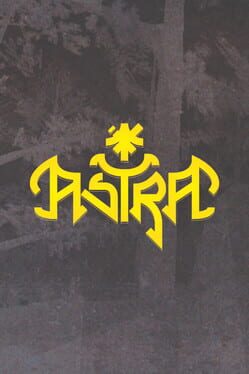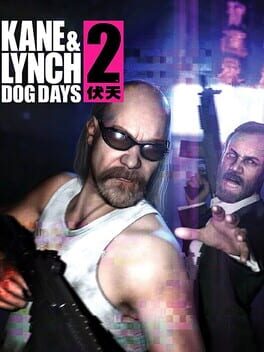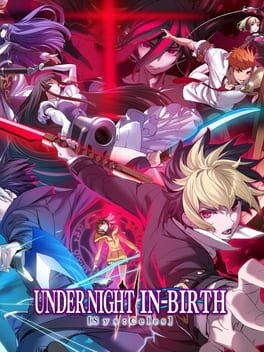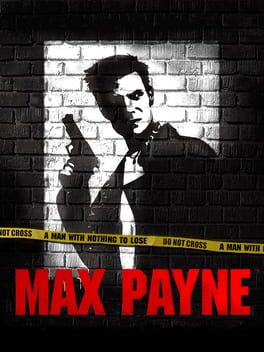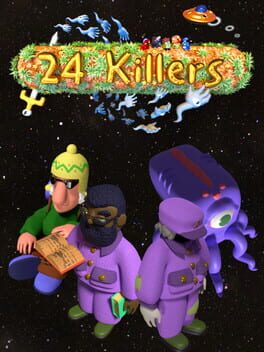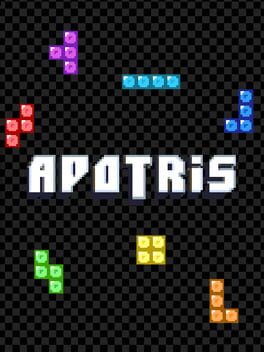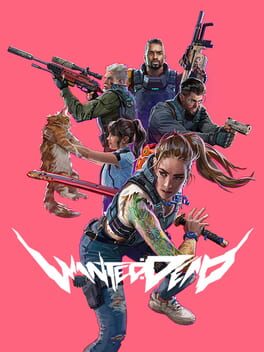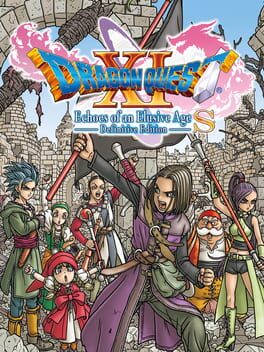aalc
29 reviews liked by aalc
Astra
TBD
As rumors of a follow up to one of the greatest fighting games of the century began circulating, most of the original Under Night’s player base began to wonder how the developers may handle a numbered sequel. I think I can speak for most people when I say UNICLR felt pretty much perfect (at least structurally) and making a brand new game seemed unnecessary at best and worrying at worst. What might French Bread change? Would they bend the knee to casual players and broaden its appeal through simplifications of its systems? Would they go the Type Lumina route and remix things in a such way to not shift the series’ DNA entirely while still feeling completely alien next to Current Code?
As I wandered the EVO floor on that fateful Friday morning and heard the news that the fated successor to our darling Under Night In-Birth Exe:Late[cl-r] was just announced and playable at that very moment, my personal anticipation and anxiety rose to all new heights. Things seemed promising from the trailer, but it was hard to judge anything for sure until I got my hands on it. After a bit of waiting in line I finally got my hands on the game, and to my absolute delight there wasn’t anything that jumped out to me. To be clear, UNICLR was never a game I was particularly great at, and as such any small tweaks and balances that did exist surely passed me by, but the foundation felt extremely similar to what I had played in the past. Somehow, it seemed like FB did the one thing no one expected but everyone secretly hoped: they didn’t fuck with the formula.
Flash forward five months, and now that I’ve had the full release of the game in my hands for the past few days I can finally confirm that this is functionally just an iterative sequel to the first game - think like how Street Fighter 4 handled its packaged versions back in the day. In fact, I’d almost liken it more to a glorified balance patch or brand new season than an entirely different game. While someone who casually messed with UNI back in the day may have yearned for more of a refresh to give the series another shot, I appreciate the restraint of the devs to understand the value of their game and not second guess themselves on old mechanics. They didn’t throw the baby out with the bath water, they didn’t make GRD easier to parse, they didn’t fix what wasn’t broken. “More of the same” is the highest compliment I can give to a game with Vorpal Cycles and Chain Shift in it.
To touch a bit on the adjustments more directly, each small new addition targets the GRD system and gives the player just a few more tools to work with and consider in a match. Things like the new forward roll aren’t terribly substantial on the face of it, but by adding more things to this towering stack of mechanics built off the same central resource, it leads to further complications in how to make the best choices in the heat of the moment. When to spend GRD for a force function, when to hold off and play defense, and when to take a chance on a shield to push the Cycle forward and build massive GRD at the risk of a Break are just a few strings of general choices you can make in a pinch, and this is only from the defending player’s perspective - this doesn’t consider how to play with GRD in neutral to even end up in these intense scrambles to begin with. For a modern comparison, in a game like Street Fighter 6 this type of complex decision-making already feels exhausting in the best ways with a lenient timer and an automatically generating central gauge to spend, so making these potentially higher risk gambles on an ever repeating 16 second timer in UNI2 feels just as if not more exciting in the heat of a match. Additions to the system could have run the risk of tipping the balance of an extremely well considered system, but at its core, UNI2 is still all about the captivating tug-of-war for GRD and the race to achieve Vorpal we all fell in love with before, just further touched up and refined in really intelligent ways.
The true meat of this package as a “sequel” really just comes in everything surrounding the game itself, which I don’t want to get too caught up in for the brevity of this blog, but it must be said that this is absolutely one of the most feature rich and complete fighting game packages ever made. Barring the exclusion of cross-play (forever and always, fuck Sony), no stone was left unturned and nothing was left behind. From intense training mode options to replay takeover functions, this game truly has every tool you could ever want and shit you probably didn’t even know you wanted, it makes you wonder how anyone can accept less complete packages from far more established developers in an era where fucking French Bread of all companies is dropping what’s unquestionably the most accessible and rich fighting game of the year.
This has always been a series I’ve held in high respects - never one I was particularly great at or could understand all the intricacies of beyond the the first layer or two, but always one I kept at the top of the stack when it came to my “casual” fighters. I’ve always been a player who loves obsessing over and gaining a strong understanding of game’s and their mechanics, so while I’m still willing to appreciate Fighting Games largely for their surface level “approachable” aspects, I always try to dig a bit deeper whenever possible. While there’s been many games over the years I’ve dreamt of attaining a greater understanding of, few have occupied as much space in my brain as Under Night. In the past it felt like a far off dream to understand the intricacies of the game, to understand something simultaneously complex and beautiful in its construction yet tragically hidden in the shadows behind passionate local communities bound by the shackles of delay-based hell. It felt impossible to slip in and catch up with everyone else in the moment, but now with the release of UNI2, I feel the spark to play and learn far more than I ever have before. For the first time in a while, the thought of going out to events big or small is alluring to me for a bit more than the usual communal aspects you tend to find with fighting games - as fun as it is to stumble into CoN5 without touching the game for months and hitting B-Tatsu in bracket without a care in the world, the drive to learn and improve for nothing more than the love of the game is something I haven’t felt as often as I’d like these days. It’s one of the many reasons I continue to show up for new fighters despite my adult life constricting the amount of time I can put into them, no other community driven games are gonna give you the same sensations as playing and learning with other community members, and that’s always a high I’ll continue to chase for the rest of my days. As much as I love falling back on old favorites, I’m so thankful companies like French Bread are still capable of lighting that spark of life within me for a new release like this. Even if you’re not into fighting games for the competitive glory or paltry prize pools of small tournaments, if you’re into the genre in literally any capacity at all, I hope this is a game that can light the spark for you too.
As I wandered the EVO floor on that fateful Friday morning and heard the news that the fated successor to our darling Under Night In-Birth Exe:Late[cl-r] was just announced and playable at that very moment, my personal anticipation and anxiety rose to all new heights. Things seemed promising from the trailer, but it was hard to judge anything for sure until I got my hands on it. After a bit of waiting in line I finally got my hands on the game, and to my absolute delight there wasn’t anything that jumped out to me. To be clear, UNICLR was never a game I was particularly great at, and as such any small tweaks and balances that did exist surely passed me by, but the foundation felt extremely similar to what I had played in the past. Somehow, it seemed like FB did the one thing no one expected but everyone secretly hoped: they didn’t fuck with the formula.
Flash forward five months, and now that I’ve had the full release of the game in my hands for the past few days I can finally confirm that this is functionally just an iterative sequel to the first game - think like how Street Fighter 4 handled its packaged versions back in the day. In fact, I’d almost liken it more to a glorified balance patch or brand new season than an entirely different game. While someone who casually messed with UNI back in the day may have yearned for more of a refresh to give the series another shot, I appreciate the restraint of the devs to understand the value of their game and not second guess themselves on old mechanics. They didn’t throw the baby out with the bath water, they didn’t make GRD easier to parse, they didn’t fix what wasn’t broken. “More of the same” is the highest compliment I can give to a game with Vorpal Cycles and Chain Shift in it.
To touch a bit on the adjustments more directly, each small new addition targets the GRD system and gives the player just a few more tools to work with and consider in a match. Things like the new forward roll aren’t terribly substantial on the face of it, but by adding more things to this towering stack of mechanics built off the same central resource, it leads to further complications in how to make the best choices in the heat of the moment. When to spend GRD for a force function, when to hold off and play defense, and when to take a chance on a shield to push the Cycle forward and build massive GRD at the risk of a Break are just a few strings of general choices you can make in a pinch, and this is only from the defending player’s perspective - this doesn’t consider how to play with GRD in neutral to even end up in these intense scrambles to begin with. For a modern comparison, in a game like Street Fighter 6 this type of complex decision-making already feels exhausting in the best ways with a lenient timer and an automatically generating central gauge to spend, so making these potentially higher risk gambles on an ever repeating 16 second timer in UNI2 feels just as if not more exciting in the heat of a match. Additions to the system could have run the risk of tipping the balance of an extremely well considered system, but at its core, UNI2 is still all about the captivating tug-of-war for GRD and the race to achieve Vorpal we all fell in love with before, just further touched up and refined in really intelligent ways.
The true meat of this package as a “sequel” really just comes in everything surrounding the game itself, which I don’t want to get too caught up in for the brevity of this blog, but it must be said that this is absolutely one of the most feature rich and complete fighting game packages ever made. Barring the exclusion of cross-play (forever and always, fuck Sony), no stone was left unturned and nothing was left behind. From intense training mode options to replay takeover functions, this game truly has every tool you could ever want and shit you probably didn’t even know you wanted, it makes you wonder how anyone can accept less complete packages from far more established developers in an era where fucking French Bread of all companies is dropping what’s unquestionably the most accessible and rich fighting game of the year.
This has always been a series I’ve held in high respects - never one I was particularly great at or could understand all the intricacies of beyond the the first layer or two, but always one I kept at the top of the stack when it came to my “casual” fighters. I’ve always been a player who loves obsessing over and gaining a strong understanding of game’s and their mechanics, so while I’m still willing to appreciate Fighting Games largely for their surface level “approachable” aspects, I always try to dig a bit deeper whenever possible. While there’s been many games over the years I’ve dreamt of attaining a greater understanding of, few have occupied as much space in my brain as Under Night. In the past it felt like a far off dream to understand the intricacies of the game, to understand something simultaneously complex and beautiful in its construction yet tragically hidden in the shadows behind passionate local communities bound by the shackles of delay-based hell. It felt impossible to slip in and catch up with everyone else in the moment, but now with the release of UNI2, I feel the spark to play and learn far more than I ever have before. For the first time in a while, the thought of going out to events big or small is alluring to me for a bit more than the usual communal aspects you tend to find with fighting games - as fun as it is to stumble into CoN5 without touching the game for months and hitting B-Tatsu in bracket without a care in the world, the drive to learn and improve for nothing more than the love of the game is something I haven’t felt as often as I’d like these days. It’s one of the many reasons I continue to show up for new fighters despite my adult life constricting the amount of time I can put into them, no other community driven games are gonna give you the same sensations as playing and learning with other community members, and that’s always a high I’ll continue to chase for the rest of my days. As much as I love falling back on old favorites, I’m so thankful companies like French Bread are still capable of lighting that spark of life within me for a new release like this. Even if you’re not into fighting games for the competitive glory or paltry prize pools of small tournaments, if you’re into the genre in literally any capacity at all, I hope this is a game that can light the spark for you too.
BioShock Infinite
2013
Max Payne
2001
Mechanically very much a product of its era in ways I both love and hate. I love the early 2000s era of 3rd person shooters from before they coalesced into the Resident Evil 4/Gears of War mold (Max Payne 3 lmao). One thing I appreciate particularly is the way the dodge roll and slow-mo dive force you into recovery rather than a simple fluid return to movement, a couple of heavy movement mechanics are generally good. I'm not so fond of this era of PC shooters where there are quicksaves rather than mid-level checkpoints, quicksaving every few encounters feels like cheating but the levels are too long to not wanna do that. Aesthetically this game also really does well with the winter atmosphere.
The game's story itself is rather cliche, but the presentation of that story is great. With all its exaggerated voice acting and live action cutscenes done by the dev team, it still presents itself seriously. Devs getting directly inserted into the game is something I really love honestly.
The game's story itself is rather cliche, but the presentation of that story is great. With all its exaggerated voice acting and live action cutscenes done by the dev team, it still presents itself seriously. Devs getting directly inserted into the game is something I really love honestly.
24 Killers
2023
send it
24 Killers is a game that grabs you with its title immediately. something i remember dwelling on the moment i had joined the game's discord late 2020. i was enthusiastic to see something like it, due to my own love and adoration for love-de-lic and Moon. the initial teaser of the world let me know that it wasn't a matter of if but when i'd visit it. and 2023.
the weight of Moon as inspiration, as not only work but thematic to be iterated upon, i think could be tremendous. it's a dark game about care, about care that you as the player invest into the game -- and in the end it challenges that very care you cultivated and rebounds it back towards you cruelly: are you giving the world outside these artificial & linear ends the same amount of love?
and that's a lot of weight, for 1997, back when games were a burgeoning medium. it's a game that says these binary constructions can only contain so much -- but your love is infinite. these digital delights have predetermined ends. and that's a thing that no other game has really tried to formalize. Moon exists in a medium where these metatextual moments are often of form but hollow. games don't tend to say things. nier can delete your save. horror games can make you think there is a virus in your pc. even narrative games with multiple endings don't reflect your intent -- endings are content to be seen regardless of canonicity. nothing really is a mirror back at you saying, "... and?"
i won't talk too much about the mechanics of 24 Killers -- it's a rich unfolding of a world a la key and lock and the more you unlock the more locks will be revealed for you, and so on. the narrative core is that you are an echo in this world's narrative: an isolated spirit from the void where there is nothing at all let alone love. your awakening into the world is a violent one -- you're angry clay, mad at moon for sculpting you into the silhouette of man.
moon asks you to cure yourself of a "curse" by helping the residents of the island while moon, in her celestial role, prepares to birth a new universe, as is customary, as is implied is the way of things. moon is at times suspicious and dogmatic but always caring and eventually you realize this space is the continuity and there's no twist or curve upcoming. the 24 killers were soldiers and others on the island who were mutated and in their loneliness alike you as an echo find yourself within them and their friendship materializes you. to be a curse is to be away from others and the bonds that connect people. the bonds therefore break the curse. not really a curse then... but the desire for home that everyone has innately. to be at home. to be loved.
and the husbandman emphasizes this to you, too, if you haven't realized it yet. you see, 24 Killers iterates on moon by saying that things matter even if they are a story. come, let's retell this story once more, and again, ten times and so on. let us make friends once more with these killers. because the care that we invest into these spaces is a reflection back onto us no matter what. and that even if these are stories hardcoded to chips and so on, so what? they make you smile, don't they?
24 Killers is a game that grabs you with its title immediately. something i remember dwelling on the moment i had joined the game's discord late 2020. i was enthusiastic to see something like it, due to my own love and adoration for love-de-lic and Moon. the initial teaser of the world let me know that it wasn't a matter of if but when i'd visit it. and 2023.
the weight of Moon as inspiration, as not only work but thematic to be iterated upon, i think could be tremendous. it's a dark game about care, about care that you as the player invest into the game -- and in the end it challenges that very care you cultivated and rebounds it back towards you cruelly: are you giving the world outside these artificial & linear ends the same amount of love?
and that's a lot of weight, for 1997, back when games were a burgeoning medium. it's a game that says these binary constructions can only contain so much -- but your love is infinite. these digital delights have predetermined ends. and that's a thing that no other game has really tried to formalize. Moon exists in a medium where these metatextual moments are often of form but hollow. games don't tend to say things. nier can delete your save. horror games can make you think there is a virus in your pc. even narrative games with multiple endings don't reflect your intent -- endings are content to be seen regardless of canonicity. nothing really is a mirror back at you saying, "... and?"
i won't talk too much about the mechanics of 24 Killers -- it's a rich unfolding of a world a la key and lock and the more you unlock the more locks will be revealed for you, and so on. the narrative core is that you are an echo in this world's narrative: an isolated spirit from the void where there is nothing at all let alone love. your awakening into the world is a violent one -- you're angry clay, mad at moon for sculpting you into the silhouette of man.
moon asks you to cure yourself of a "curse" by helping the residents of the island while moon, in her celestial role, prepares to birth a new universe, as is customary, as is implied is the way of things. moon is at times suspicious and dogmatic but always caring and eventually you realize this space is the continuity and there's no twist or curve upcoming. the 24 killers were soldiers and others on the island who were mutated and in their loneliness alike you as an echo find yourself within them and their friendship materializes you. to be a curse is to be away from others and the bonds that connect people. the bonds therefore break the curse. not really a curse then... but the desire for home that everyone has innately. to be at home. to be loved.
and the husbandman emphasizes this to you, too, if you haven't realized it yet. you see, 24 Killers iterates on moon by saying that things matter even if they are a story. come, let's retell this story once more, and again, ten times and so on. let us make friends once more with these killers. because the care that we invest into these spaces is a reflection back onto us no matter what. and that even if these are stories hardcoded to chips and so on, so what? they make you smile, don't they?
Signalis
2022
Apotris
2022
What is the best version of Tetris? Depending on the kind of Tetris you’re used to playing, the answer to that question will vary wildly. If you grew up on the rigid simplicity of NES Tetris, you might prefer to stick with that version. There’s a passionate cult of devotees for each iteration of Tetris the Grand Master, for those that love the intensity of a finely tuned competitive arcade experience. If you’re more into style over gameplay, perhaps you’ll gravitate to the proto-vaporwave aesthetics of Tetris for the Philips CD-i or the sensory overload of Tetsuya Mizuguchi’s Tetris Effect. If for some reason you wanna stack blocks but you also want to get horny, there’s even a pirate game for DOS platforms called Porntris. With all of these different versions of the tetromino stacking game out there, who exactly is Apotris for?
The homebrew title, developed solely by Game Boy Advance enthusiast Apostolos, aims to provide a little something for everyone via a truly staggering amount of customization. Whether you want flashy visuals or the most utilitarian options for clarity, Apotris has settings that are likely to work for you. Ghost blocks and grid views are available to ensure that you know exactly where your tetrominoes will fall, or you can take the training wheels off entirely if you’d prefer more difficulty. You can play a traditional marathon mode, a timed sprint mode in which you clear a predetermined number of lines (by far the best mode for practicing speed and building muscle memory), or puzzle modes for testing your problem solving in unconventional stacking situations. There’s even a classic mode if you’re not particularly a fan of modern Tetris mechanics.
Apotris doesn’t manage to capture all the possibilities of Tetris; that’s impossible. But it comes closer than anything else has managed. It’s most suited to speed demons that are accustomed to modern Tetris mechanics—so unique games like the Grand Masters, Tetris Effect, or Tetris 99 will always have their niche—but Apotris does what it does better than almost any other Tetris game released after 2001, when the standardized guidelines for gameplay were written. I find myself reaching for Apotris whenever I simply want to play Tetris. It’s hard to overstate how impressive it is to establish yourself as the most solid option when you’re competing with hundreds of different games.
The homebrew title, developed solely by Game Boy Advance enthusiast Apostolos, aims to provide a little something for everyone via a truly staggering amount of customization. Whether you want flashy visuals or the most utilitarian options for clarity, Apotris has settings that are likely to work for you. Ghost blocks and grid views are available to ensure that you know exactly where your tetrominoes will fall, or you can take the training wheels off entirely if you’d prefer more difficulty. You can play a traditional marathon mode, a timed sprint mode in which you clear a predetermined number of lines (by far the best mode for practicing speed and building muscle memory), or puzzle modes for testing your problem solving in unconventional stacking situations. There’s even a classic mode if you’re not particularly a fan of modern Tetris mechanics.
Apotris doesn’t manage to capture all the possibilities of Tetris; that’s impossible. But it comes closer than anything else has managed. It’s most suited to speed demons that are accustomed to modern Tetris mechanics—so unique games like the Grand Masters, Tetris Effect, or Tetris 99 will always have their niche—but Apotris does what it does better than almost any other Tetris game released after 2001, when the standardized guidelines for gameplay were written. I find myself reaching for Apotris whenever I simply want to play Tetris. It’s hard to overstate how impressive it is to establish yourself as the most solid option when you’re competing with hundreds of different games.
Wanted: Dead
2023
It's really weird that the narrative around this game has become that it's some kind of corporate money laundering affair or some other cheap passionless writeoff when it's just, like, no? Obviously this is an extreme passion vanity project the likes of which rarely gets mass distribution in video games even in the indie scene, let alone a boxed product by a reputable developer. This is more like something that would get dropped by Pendulum Pictures on a box of 50 shot on video flicks than anything else. And guess what? That is my entire vibe.
Every moment of a cutscene in this game is an unhinged surreal delight, CGI PS360 cutscene anime filtered through 9 layers of google translate. I can't tell you a thing that happened in this game but I can tell you that Herzog's stories have more male nudity in them than a Joaquin Phoenix movie and I did a stunningly difficult karaoke minigame to 99 Luftballoons while my character and Stephanie Joosten looked like they were singing at gunpoint.
The weirdness carries over into the traditional levels too, with dialogue peppered in and just an incredible awkwardness to every combat encounter. Guns are formally useless (one of the things I think is surprisingly worse about this game next to Devil's Third, a modern gaming classic) and swordplay is very simplistic, but there's fun to be had in the RSI inducing button mashing, mostly because it's really difficult so you have to actually learn parries and shit. There are encounters that are like pulling fucking teeth though, the boss fight against August is one of the absolute worst I can remember, the game is just not fair or deep or varied lol. It is fun tho. I like the lil hub zone too, love a hub, love wandering around hearing the inscrutable cop dialogue.
This game is set in Hong Kong but there's like no Chinese characters at all?
Also it's explicitly set in 2022 so I guess it's alt history?
Sometimes the cutscenes are anime?
Sometimes you see actual Stephanie Joosten playing with her band?
Every moment of a cutscene in this game is an unhinged surreal delight, CGI PS360 cutscene anime filtered through 9 layers of google translate. I can't tell you a thing that happened in this game but I can tell you that Herzog's stories have more male nudity in them than a Joaquin Phoenix movie and I did a stunningly difficult karaoke minigame to 99 Luftballoons while my character and Stephanie Joosten looked like they were singing at gunpoint.
The weirdness carries over into the traditional levels too, with dialogue peppered in and just an incredible awkwardness to every combat encounter. Guns are formally useless (one of the things I think is surprisingly worse about this game next to Devil's Third, a modern gaming classic) and swordplay is very simplistic, but there's fun to be had in the RSI inducing button mashing, mostly because it's really difficult so you have to actually learn parries and shit. There are encounters that are like pulling fucking teeth though, the boss fight against August is one of the absolute worst I can remember, the game is just not fair or deep or varied lol. It is fun tho. I like the lil hub zone too, love a hub, love wandering around hearing the inscrutable cop dialogue.
This game is set in Hong Kong but there's like no Chinese characters at all?
Also it's explicitly set in 2022 so I guess it's alt history?
Sometimes the cutscenes are anime?
Sometimes you see actual Stephanie Joosten playing with her band?
This review contains spoilers
So, what the hell is Act 3?
Dragon Quest XI is full of endlessly endearing characters, constantly pleasurable combat, and a sense of warmth and wonder that few experiences can rival. I'd call it one of my favorite games. But, the thing my thoughts kept returning to for days after finishing it was Act 3. What the hell is it??
After DQXI's antagonist is defeated and the ending credits roll, a lengthy additional scenario for the player begins, generally referred to as the Post-Game or "Act 3." Taking place after the end credits, it's framed as an extra optional adventure, though some story elements from the main game only see their ultimate resolution in Act 3. I decided to play through Act 3 in order to see everything that DQXI had to offer. I loved the main game, after all!
I'd characterize my initial experience with Act 3 with two words: Whiplash and bafflement. Why why why is this game un-sticking its own landing to have me undermine its most emotionally impactful moments?
The scenario of Act 3 is built around using time travel to undo the death of the character and party member Veronica. Her death happens suddenly and silently in the main story; the player won't learn that she is dead until many hours after she sacrificed herself. There are no tearful last words, no encouragement to finish the quest from the dying, the player just gets separated from her at one point, and instead of a reunion, there's her body.
In a game principally concerned with the undiluted joys of love and friendship and the appeal of just spending time with people you care about, Veronica's death is titanic. DQXI semi-frequently punctuates its usually lighthearted fairy tale tone with moments of sadness, loss, and despair to contrast with and underscore the importance of its joyful themes, but Veronica's death is a step beyond. It constitutes a massive, tangible loss for both the principal characters and the player. Veronica stops being a playable character, she can no longer be a piece of any party composition in the dozens of battles to come, she won't be hanging out in camp, she won't have any optional dialogue, she won't feature in any story scenes going forward. These things may seem obvious but in the tens of hours I had been playing up til then, Veronica had become a staple of my experience in the game. She was an integral member of my band of friends and I had expected to return her to the party when I found her after all the characters were scattered at the end of "Act 1." After spending so many great hours with DQXI, her death cast a shadow of sadness over the rest of my experience.
She's survived by her sister Serena, who resolves to continue adventuring with the player and to live for the both of them. She cuts her hair and inherits a piece of Veronica's spirit, and from then on in gameplay Serena possesses the powers and abilities of both herself and her sister. She quietly carries Veronica's memory with her for the rest of the game, and every time the player uses her to cast one of Veronica's spells during combat they are reminded that no one is ever truly gone forever. It's a simple, beautiful way to imbue the basic fabric of a game with emotional resonance. Act 3 is about taking all that away.
That is maybe a bit uncharitable to say, but it is fundamentally true. Act 3 sees the hero traveling back in time to keep Veronica from dying and then saving the day all over again with her in tow. In this reality, Serena never suffers that loss and never resolves to remain strong in the face of grief. The bonds of the party are never strained and strengthened by the loss of their loved one. Similarly, other hard lessons are unlearned as well. Another party member, Erik, has his confrontation and reconciliation with his sister erased and replaced with an altogether more abridged and tidy reunion. Michelle the mermaid never sees her tragic story concluded, Sylvando never finds purpose forming a traveling troupe to bring joy to a despairing world. People all over Dragon Quest XI's world never experience the dark era of strife brought on by the game's antagonist. In the main story the hero fails to stop him at the end of Act 1, and the player is made to live with the cataclysmic consequences while experiencing both struggle and hope in the process of rebuilding. In Act 3's revised history, all this darkness is made squeaky clean by comparison. In a game that previously seemed to be putting forth the importance of hope and perseverance in the face of life's tragedies, Act 3 seems to be saying that hardship is fundamentally inappropriate to a happy life, and that it would be better for those hard lessons to never be learned at all, fantasizing that all the bad in the world can be magically painted over, completely exiting any emotional reality that a player could experience themselves in their own life.
This is roughly the message I got from Act 3 at first blush. However, I want to challenge my own premise here, because after some time and a lot of thought, I've come to view Act 3 in a different way that, while not fully making me love its direction, helps me to appreciate and reconcile it with the overall shape of DQXI as a piece of art.
For me to make peace with Act 3, I first had to accept that it's primarily an exercise in wish-fulfillment. At the end of the main game I had so much affection for those characters that a chance to spend dozens more hours with them was everything I could ask for! Act 3 is wish-fulfillment on a deeper thematic layer too. The main story spends a lot of its focus on imparting its ostensibly light-hearted storybook narrative with a sense of emotional tangibility. It reaches out to the player with moments of irrevocable sadness followed by moments of joy, friendship, and solidarity despite it all, and asks the player to see the value in these things. In reality you can't take back regrets or bring back the people you lose. The purpose of Act 3 is to willfully engage in a fantasy contrary to the rest of the game, though just because it's contrary doesn't mean it doesn't have value.
By doing the impossible and rewriting history in Act 3, the player and the hero perform a service out of love for the people they care about. Their friends will never know the strife that might have been. Given the opportunity, What lengths would you not go to, to protect the ones you love from pain? Given that very opportunity, the hero of Dragon Quest XI changes the entire fabric of the world, because reality is a small price to pay to see a friend smile again. The world is already full to bursting with hurt and sadness, it won't miss the little that you take away.
Act 3 taps into the impulse to wish you could truly save the day and make everything okay for the people that matter to you. In real life, this can be an impossible and even unhelpful idea when pushed too far, and I'm personally more drawn to the world of real emotional consequence presented by the main story, so the real Dragon Quest XI will always sort of end for me at the conclusion of Act 2. But Act 3 lets the player spend time in the fantasy, spend more time with their friends, be the hero they cannot be in real life. It's a videogame, why not take this chance to live inside it as you cannot outside it? As a purely additional coda to a game all about the connections we make, it strikes me as somewhat beautiful that in Act 3, you never have to say goodbye.
Dragon Quest XI is full of endlessly endearing characters, constantly pleasurable combat, and a sense of warmth and wonder that few experiences can rival. I'd call it one of my favorite games. But, the thing my thoughts kept returning to for days after finishing it was Act 3. What the hell is it??
After DQXI's antagonist is defeated and the ending credits roll, a lengthy additional scenario for the player begins, generally referred to as the Post-Game or "Act 3." Taking place after the end credits, it's framed as an extra optional adventure, though some story elements from the main game only see their ultimate resolution in Act 3. I decided to play through Act 3 in order to see everything that DQXI had to offer. I loved the main game, after all!
I'd characterize my initial experience with Act 3 with two words: Whiplash and bafflement. Why why why is this game un-sticking its own landing to have me undermine its most emotionally impactful moments?
The scenario of Act 3 is built around using time travel to undo the death of the character and party member Veronica. Her death happens suddenly and silently in the main story; the player won't learn that she is dead until many hours after she sacrificed herself. There are no tearful last words, no encouragement to finish the quest from the dying, the player just gets separated from her at one point, and instead of a reunion, there's her body.
In a game principally concerned with the undiluted joys of love and friendship and the appeal of just spending time with people you care about, Veronica's death is titanic. DQXI semi-frequently punctuates its usually lighthearted fairy tale tone with moments of sadness, loss, and despair to contrast with and underscore the importance of its joyful themes, but Veronica's death is a step beyond. It constitutes a massive, tangible loss for both the principal characters and the player. Veronica stops being a playable character, she can no longer be a piece of any party composition in the dozens of battles to come, she won't be hanging out in camp, she won't have any optional dialogue, she won't feature in any story scenes going forward. These things may seem obvious but in the tens of hours I had been playing up til then, Veronica had become a staple of my experience in the game. She was an integral member of my band of friends and I had expected to return her to the party when I found her after all the characters were scattered at the end of "Act 1." After spending so many great hours with DQXI, her death cast a shadow of sadness over the rest of my experience.
She's survived by her sister Serena, who resolves to continue adventuring with the player and to live for the both of them. She cuts her hair and inherits a piece of Veronica's spirit, and from then on in gameplay Serena possesses the powers and abilities of both herself and her sister. She quietly carries Veronica's memory with her for the rest of the game, and every time the player uses her to cast one of Veronica's spells during combat they are reminded that no one is ever truly gone forever. It's a simple, beautiful way to imbue the basic fabric of a game with emotional resonance. Act 3 is about taking all that away.
That is maybe a bit uncharitable to say, but it is fundamentally true. Act 3 sees the hero traveling back in time to keep Veronica from dying and then saving the day all over again with her in tow. In this reality, Serena never suffers that loss and never resolves to remain strong in the face of grief. The bonds of the party are never strained and strengthened by the loss of their loved one. Similarly, other hard lessons are unlearned as well. Another party member, Erik, has his confrontation and reconciliation with his sister erased and replaced with an altogether more abridged and tidy reunion. Michelle the mermaid never sees her tragic story concluded, Sylvando never finds purpose forming a traveling troupe to bring joy to a despairing world. People all over Dragon Quest XI's world never experience the dark era of strife brought on by the game's antagonist. In the main story the hero fails to stop him at the end of Act 1, and the player is made to live with the cataclysmic consequences while experiencing both struggle and hope in the process of rebuilding. In Act 3's revised history, all this darkness is made squeaky clean by comparison. In a game that previously seemed to be putting forth the importance of hope and perseverance in the face of life's tragedies, Act 3 seems to be saying that hardship is fundamentally inappropriate to a happy life, and that it would be better for those hard lessons to never be learned at all, fantasizing that all the bad in the world can be magically painted over, completely exiting any emotional reality that a player could experience themselves in their own life.
This is roughly the message I got from Act 3 at first blush. However, I want to challenge my own premise here, because after some time and a lot of thought, I've come to view Act 3 in a different way that, while not fully making me love its direction, helps me to appreciate and reconcile it with the overall shape of DQXI as a piece of art.
For me to make peace with Act 3, I first had to accept that it's primarily an exercise in wish-fulfillment. At the end of the main game I had so much affection for those characters that a chance to spend dozens more hours with them was everything I could ask for! Act 3 is wish-fulfillment on a deeper thematic layer too. The main story spends a lot of its focus on imparting its ostensibly light-hearted storybook narrative with a sense of emotional tangibility. It reaches out to the player with moments of irrevocable sadness followed by moments of joy, friendship, and solidarity despite it all, and asks the player to see the value in these things. In reality you can't take back regrets or bring back the people you lose. The purpose of Act 3 is to willfully engage in a fantasy contrary to the rest of the game, though just because it's contrary doesn't mean it doesn't have value.
By doing the impossible and rewriting history in Act 3, the player and the hero perform a service out of love for the people they care about. Their friends will never know the strife that might have been. Given the opportunity, What lengths would you not go to, to protect the ones you love from pain? Given that very opportunity, the hero of Dragon Quest XI changes the entire fabric of the world, because reality is a small price to pay to see a friend smile again. The world is already full to bursting with hurt and sadness, it won't miss the little that you take away.
Act 3 taps into the impulse to wish you could truly save the day and make everything okay for the people that matter to you. In real life, this can be an impossible and even unhelpful idea when pushed too far, and I'm personally more drawn to the world of real emotional consequence presented by the main story, so the real Dragon Quest XI will always sort of end for me at the conclusion of Act 2. But Act 3 lets the player spend time in the fantasy, spend more time with their friends, be the hero they cannot be in real life. It's a videogame, why not take this chance to live inside it as you cannot outside it? As a purely additional coda to a game all about the connections we make, it strikes me as somewhat beautiful that in Act 3, you never have to say goodbye.
